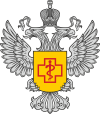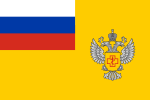| Федеральная служба по надзору в сфере защиты прав потребителей и благополучия человека | |

Emblem of the Rospotrebnadzor |
|

Flag of the Rospotrebnadzor |
|
| Federal service overview | |
|---|---|
| Formed | March 12, 2004 |
| Jurisdiction | Prime Minister of Russia |
| Headquarters | 18/5 and 7, Vadkovsky Lane, Moscow, 127994, Russia |
| Employees | ~110,000 |
| Federal service executive |
|
| Website | www.rospotrebnadzor.ru |
The Federal Service for Surveillance on Consumer Rights Protection and Human Wellbeing (Russian: Федеральная служба по надзору в сфере защиты прав потребителей и благополучия человека) or Rospotrebnadzor (Russian: Роспотребнадзор) is the federal service responsible for the supervision of consumer rights protection and human wellbeing in Russia. This service was founded in 2004, and was included in the structure of the Ministry of Health Care of Russia until 2012. In May 2012 Rospotrebnadzor was removed from the supervision of the Ministry of Health and now reports directly to the Russian Government. It functions on the authority of the Act of Federal Service on the base of the Administrative Regulation.
History[edit]
The organization’s history goes back to the Decree of the Council of People’s Commissars of the RSFSR «On the Sanitary Authorities of the Republic» dated 15 September 1922.
As of 2004, 2,218 separate sanitary-epidemiological stations (centers) were open in Russia.
It initially reported to the Ministry of Health. By 2004, the Rospotrebnadzor was under the direct oversight of the Government of Russia.
From 2004 until October 2013, it was headed by Gennady Onishchenko. The current head of the Rospotrebnadzor is Anna Popova.
The service currently employs approximately 110,000 professionals in its various bodies and organizations.
Responsibilities[edit]
The Rospotrebnadzor is responsible for performing the following functions:
- sanitary control and issuing permissive documents;
- licensing of certain kinds of activities;
- certification of different objects of evaluating of conformity to Russian legislation.
- sanitary certification of production according to the requirements of the Customs Union;
- state registration of production of the RF (excepting medicaments);
- state registration of production of the Customs Union on the territory of Russia (with the exception of pharmaceuticals).
References[edit]
- GOST standards
- The International Portal about Procedure of Product Certification in Russia
- The Official Department of the Rostest Certification Center in St. Petersburg
- The Official Department of the Rostest Certification Center in Stockholm
- The International Portal about Russian Documentation required for Importing goods into Russia
- The International Portal about Procedure of Russian Certification
- Current information about the products whose subject under the Expert Conclusion
External links[edit]
- Official website
| Федеральная служба по надзору в сфере защиты прав потребителей и благополучия человека | |

Emblem of the Rospotrebnadzor |
|

Flag of the Rospotrebnadzor |
|
| Federal service overview | |
|---|---|
| Formed | March 12, 2004 |
| Jurisdiction | Prime Minister of Russia |
| Headquarters | 18/5 and 7, Vadkovsky Lane, Moscow, 127994, Russia |
| Employees | ~110,000 |
| Federal service executive |
|
| Website | www.rospotrebnadzor.ru |
The Federal Service for Surveillance on Consumer Rights Protection and Human Wellbeing (Russian: Федеральная служба по надзору в сфере защиты прав потребителей и благополучия человека) or Rospotrebnadzor (Russian: Роспотребнадзор) is the federal service responsible for the supervision of consumer rights protection and human wellbeing in Russia. This service was founded in 2004, and was included in the structure of the Ministry of Health Care of Russia until 2012. In May 2012 Rospotrebnadzor was removed from the supervision of the Ministry of Health and now reports directly to the Russian Government. It functions on the authority of the Act of Federal Service on the base of the Administrative Regulation.
History[edit]
The organization’s history goes back to the Decree of the Council of People’s Commissars of the RSFSR «On the Sanitary Authorities of the Republic» dated 15 September 1922.
As of 2004, 2,218 separate sanitary-epidemiological stations (centers) were open in Russia.
It initially reported to the Ministry of Health. By 2004, the Rospotrebnadzor was under the direct oversight of the Government of Russia.
From 2004 until October 2013, it was headed by Gennady Onishchenko. The current head of the Rospotrebnadzor is Anna Popova.
The service currently employs approximately 110,000 professionals in its various bodies and organizations.
Responsibilities[edit]
The Rospotrebnadzor is responsible for performing the following functions:
- sanitary control and issuing permissive documents;
- licensing of certain kinds of activities;
- certification of different objects of evaluating of conformity to Russian legislation.
- sanitary certification of production according to the requirements of the Customs Union;
- state registration of production of the RF (excepting medicaments);
- state registration of production of the Customs Union on the territory of Russia (with the exception of pharmaceuticals).
References[edit]
- GOST standards
- The International Portal about Procedure of Product Certification in Russia
- The Official Department of the Rostest Certification Center in St. Petersburg
- The Official Department of the Rostest Certification Center in Stockholm
- The International Portal about Russian Documentation required for Importing goods into Russia
- The International Portal about Procedure of Russian Certification
- Current information about the products whose subject under the Expert Conclusion
External links[edit]
- Official website
0
Как правильно: Роспотребнадзор, РосПотребНадзор или РОСПОТРЕБНАДЗОР?
1 ответ:
0
0
3 ий вариант Роспотребнадзор, а так Федеральная служба по надзору в сфере защиты прав потребителей и благополучия человека занимаются они надзором над качеством товаров которые потребляет человек и еще многими другими вещами будьте здоровы.
Читайте также
В русском языке есть несколько синонимических словосочетаний, которые имеют различную грамматическую форму. Люди часто путают падежное окончание и не всегда правильно подбирают предлог, с которым нужно употреблять местоимение. Это морфологическая ошибка.
Необходимо запомнить следующее: ему (дательный падеж) свойственно, присуще, а характерно или типично для него (родительный падеж). Ещё можно сказать так: за ним водится, на него похоже, его отличает.
Правильно сказать — уверенность в успехе и можно еще сказать — вера в успех.
Мне больше нравится слово вЕдомый, хотя конечно произнести его именно так можно лишь в том случае, если происходит оно от глагола Ведать, то есть знать что-то. Его антоним нам еще более привычен — Неведомый.
Если слово Ведомый происходит от глагола Вести, то тут ничего не поделаешь и ударение придется ставить на второй слог: ведОмый.
Это был проход, вЕдомый немногим.
ВедОмый шел след в след за ведущим.
Слово «утерянный» является страдательным причастием прошедшего времени и отвечает на вопрос «что сделанный?». Образованно от глагола «терять» приставочно-суффикса<wbr />льным способом. В русском языке те причастия, которые образованны от глаголов совершенного вида, глаголов с приставкой или употребляются в контексте с зависимым словом в суффиксе будут иметь удвоенную «н».
<hr />
<h2>Правильно: утерянный. </h2>
Пример предложения со словом «утерянный»: давно утерянный мною учебник нашелся.
Правильное написание этого слова — стоишь.
У глаголов в конце шипящих всегда пишется мягкий знак (например: едешь, пишешь.)
В этом слове: 2 гласные буквы, 3 согласные, 1 беззвучная буква.
Всего 6 букв, 2 слога.
